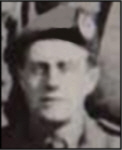



No.65704, Lieutenant, The Hon. Henry Kerr Auchmuty CECIL
Aged 28

|
The Hon Henry Kerr Auchmuty Cecil was born on 1st April 1914 (Farnham Q2-1914 2A:241), son of Capt.The Hon.William Amherst CECIL M.C. and Gladys Evelyn CECIL (née BAGGALLAY). His father William, of the family of the Marquess of Exeter and the son of Baroness Amherst, was also killed in action, in the first battle of Aisne in 1914. He was the father of Sir Henry Cecil, the racehorse trainer. Neither man ever knew his father He was educated at Eton and Trinity College, Cambridge (where he is named on the Chapel memorial). Commissioned in 1936 (Gazette 2nd Lt.,Welsh Guards 1st April 1936, then to 7th Hussars (Gazette 27th August 1937). He married Elizabeth Rohays Mary Burnett, the daughter of the Major-General Sir James Burnett, 13th Baronet Burnett of Leys, CB, CMG, DSO. His widow moved to Wickhambrook (Gesyns Farm) from Crathes Castle when Henry was killed. His father was killed in France in 1914 see here |

|
From the Parachute Regiment's archives at the Airborne Assault centre, Imperial War Museum, :- The Battle of Oudna (7 miles from Tunis), after Operation Torch, the Allied invasion of French North Africa: At the end of November 1942, the 2nd Bn, in which Lt Cecil served, found itself at the head of a rapid eastward drive across North Africa as the Allies tried to sweep the Germans out of the continent. Henry's last action was when the battalion had been sent ahead of the main advance to destroy aircraft at German airfields in Tunisia. Their drop, 50 miles behind enemy lines, was spotted by German patrols, who brought in reinforcements. At the same time, the main Allied force, which was supposed to be advancing, was delayed. The Germans called on the surrounded and relatively lightly defended Paras to surrender, but the call was rejected. With tanks, heavy mortar, artillery and machine-gun fire, the Germans attacked. After two hours, Cecil, 28, was dead, and his unit, "C" Company, had, according to the documents,"almost ceased to exist as a fighting unit". The survivors were saved only after German fighter aircraft swooped down and mistakenly attacked their own men, knocking out several of their tanks. The remnants of the battalion then staged a lengthy, fighting withdrawal over the following night and day, fending off German attacks, before finally reaching Allied lines at Medjez El Bab.
photo: Commonwealth War Graves Commission click here to go to the Commonwealth War Graves Commission website for full cemetery/memorial details |